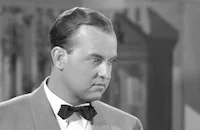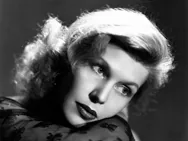You Can't Cheat an Honest Man

Brief Synopsis
Cast & Crew
George Marshall
W. C. Fields
Edgar Bergen
Charlie Mccarthy
Constance Moore
John Arledge
Film Details
Technical Specs

Synopsis
Circus owner Larson E. Whipsnade, a shoe-string P. T. Barnum, is pursued by a barrage of sheriffs bearing summonses. One day, Whipsnade's daughter Victoria visits from college and meets ventriloguist Edgar Bergen and his dummy, Charlie McCarthy. While aloft in a hot air balloon, Vickie and Edgar fall in love, but when Vickie learns of her father's dire financial circumstances, she agrees to marry wealthy socialite Roger Bel-Goodie, although she does not love him. As Vickie drives off to wed Roger, Whipsnade cuts the anchor rope to Edgar and Charlie's balloon, sending them aloft. Desperate, the pair parachute to the ground, land in Vickie's speeding car and are all arrested by the police. As the wedding party awaits the tardy bride, Whipsnade arrives in a horse drawn chariot and proceeds to infuriate the snobbish Bel-Goodies with his boorish behavior. After being released on bail, Vickie rushes to the Bel-Goodie mansion to find her prospective in-laws locked in a battle of insults with her father. When the sheriff appears to serve Whipsnade with yet another summons, Vickie, her brother Phineas and father leap into the chariot and speed away, passing a bicycling Edgar. As Vickie shouts to Edgar that she is free to marry him, he peddles his bicycle in pursuit of the chariot.

Director

George Marshall
Cast

W. C. Fields

Edgar Bergen
Charlie Mccarthy
Constance Moore

John Arledge
James Bush

Thurston Hall
Mary Forbes

Edward Brophy

Arthur Hohl
Princess Baba
Blacaman

Eddie Anderson
Charles Coleman

Grady Sutton
Ferris Taylor
Ivan Lebedeff
Frank Jenks
David Oliver
Jan Duggan
Don Terry
Byron Munson

Lloyd Ingraham

Dorothy Arnold

Irving Bacon
Evelyn Del Rio
Si Jenks
Joe King
Frank Melton
Ralph Sanford
Eddy Chandler
Eddie Dunn
Lelah Tyler
Jack Clifford
Otto Hoffman
Delmar Watson
George Offerman Jr.
Grace Goodall
Minerva Urecal
Dick Dickinson
Walter Tetley

Lee Phelps
Edward Woolff
Ray Moyer

Kay Marlowe
Jenifer Gray
George Ovey
Billy Engle
Beryl Wallace
Jack Gardner
Duke York
Art Yeoman
Ernie Adams
Drew Demarest
James Lucas
Jack Kenny
Dora Clement
James Morton
Crew
Charles Bogle
Bernard B. Brown
Charles H. Clarke
Edward F. Cline
Lester Cowan
Everett Freeman
R. A. Gausman
Henry Johnson
Vernon Keays
Milton Krasner
Lew Lipton
Otto Ludwig
Richard Mack
George Marion Jr.
Jack Otterson
Charles Previn
Robert Pritchard
Edward Sedgwick
Manuel Seff
James Seymour
Vera West

Videos
Movie Clip



Film Details
Technical Specs

Articles
You Can't Cheat An Honest Man
While Whipsnade assumes a variety of disguises to evade the police - even donning drag as "Buffalo Bella" the bearded lady bareback rider - his daughter Vicky (Constance Moore) on the other side of the tracks is engaged in evasive measures of her own. Pursued by the rich, but shallow Roger Bel-Goodie (James Bush), who wants to marry her, and hounded by her brother Phineas (John Arledge), who encourages the financially lucrative union, Vicky runs off to the circus and into the welcoming embrace of her eccentric daddy. It is there that Vicky Whipsnade finds love in the unlikely guise of a dummy and his handler, the famous comedy "team" of Charlie McCarthy and Edgar Bergen.
That perennial movie plotline - will love prevail? - provides the structure for You Can't Cheat An Honest Man but it's W.C. Fields' hilarious tomfoolery that keeps the film moving at a jaunty clip. Fields proves as agile at physical comedy (performing an Austin Powers-style naked stroll through the circus) as verbal repartee, flinging saucy insults with a knife-thrower's precision. Displaying his famous disdain for dogs and children, Fields sneers at a young whippersnapper tugging on his shirtsleeves, "you kids are disgusting...staggering around here all day reeking of popcorn and lollipops."
But all of You Can't Cheat An Honest Man's comedy isn't necessarily in such good fun. The film exhibits some of the unpleasant and racist typecasting of its day, from Charlie McCarthy appearing in blackface, to the butt-of-the-joke clowning of black character actor Eddie "Rochester" Anderson as Whipsnade's dim, obedient lackey "Cheerful."
Known for his singular comic creation of the cynical huckster with a weakness for whiskey (a personality trait drawn from Fields' own dipsomaniac proclivities) and a disdain for the kiddies, W.C. Fields has become one of the most memorable characters in the cinema's history and was embraced by the counter cultural movement of the early 1970s, who "dug" his selfish pursuits and unapologetic irreverence.
Trained on the vaudeville stage, William Claude Fields bridged the old entertainment form and the new one - of cinema - during his successful showbiz career. Traces of Fields' vaudeville training can be seen in You Can't Cheat An Honest Man (written by Fields under the name Charles Bogle). Direct from the music hall stage are the ludicrously-named characters, racist humor and the steady stream of comic vignettes strung together with the mere semblance of a plot.
Fields was as cantankerous off-screen as the characters he played. There was reportedly such tension between Fields and the film's director George Marshall, that another director, Eddie Cline, who had directed Fields in Million Dollar Legs (1932) was brought in to handle all of the scenes involving the star. Cline went on to direct Fields in what are considered three of his finest films The Bank Dick (1940), Never Give A Sucker an Even Break (1941) and My Little Chickadee (1940). Though the tension between Fields and Marshall was very real, the film also capitalized on the mock "feud" between wooden "woodpecker's snack bar" Charlie McCarthy and Fields begun on radio's popular "The Edgar Bergen and Charlie McCarthy Show" which cast McCarthy as the bratty, wayward son and Fields as his disgusted Pop.
Producer: Lester Cowan
Director: Edward F. Cline, George Marshall
Screenplay: W.C. Fields (story) (as Charles Bogle), Everett Freeman, Richard Mack, George Marion Jr.
Production Design: Jack Otterson
Cinematography: Milton R. Krasner
Costume Design: Vera West
Film Editing: Otto Ludwig
Original Music: Sam Perry (uncredited), Charles Previn, Frank Skinner (uncredited), Paul Van Loan (uncredited), Franz Waxman (uncredited)
Cast: W.C. Fields (Larson E. Whipsnade), Edgar Bergen (The Great Edgar), Constance Moore (Victoria Whipsnade), John Arledge (Phineas Whipsnade), James Bush (Roger Bel-Goodie III).
BW-76m.
by Felicia Feaster

You Can't Cheat An Honest Man
Quotes
I'm taking on the personality of a Mexican jumping bean. First the contortionist gets rheumatism. Then the sword-swallower gets tonsilitis. Hope nothing happens to that fan dancer... not 'til I get rid of this cold, anyway.- Whipsnade
You kids are disgusting! Standing around all day, reeking of popcorn and lollipops.- Whipsnade
I'd rather have two girls / At twenty-one each / Than one girl at forty-two!- Whipsnade
There's been a mistake in my change.- Man
Ah, at long last, an honest man. Want to return some money?- Whipsnade
No, I'm short!- Man
Don't brag about it. I'm only five-feet-eight myself.- Whipsnade
As my dear old grandfather Litvak said (just before they swung the trap), he said "You can't cheat an honest man. Never give a sucker an even break or smarten up a chump."- Whipsnade
Trivia
Fields & Bergen were paid a $100,000 each. Fields was paid $25,000 for writing the script.
Notes
Charles Bogle was a pseudonym for W. C. Fields. Charlie McCarthy was ventriloquist Edgar Bergen's dummy. Bergen's dummy Mortimer Snerd also appeared in this film. News items in Hollywood Reporter note that Edward Sedgwick was added as second unit director to rush the completion of the film for a February release. Sedgwick left after five days and was replaced by Eddie Cline. Modern sources add that a drunken Fields insisted upon playing a death scene with his wife in the picture, although his character had no wife. When the studio refused, Fields walked off the set and his double was used for the remainder of the shots.














